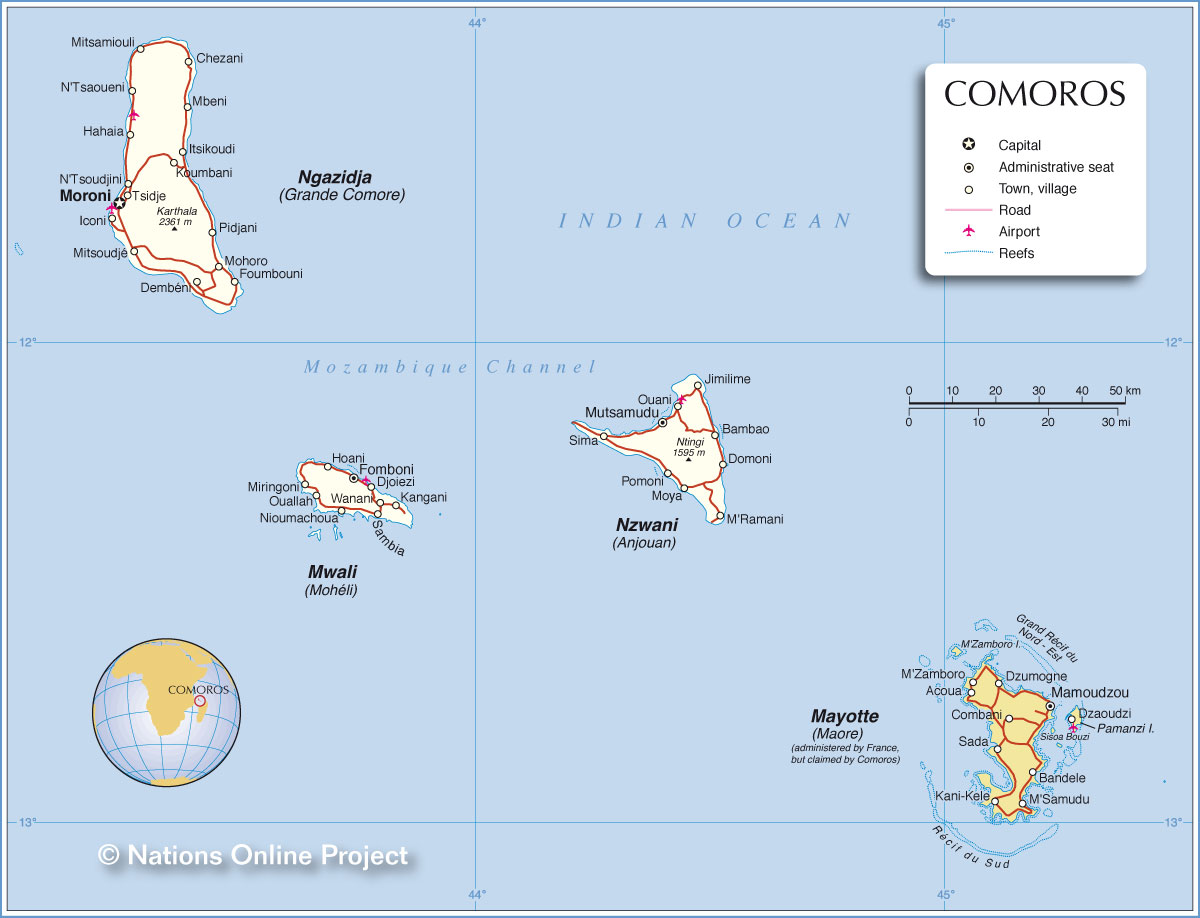From Jack:
Comoros: A land of near misses
I traveled recently to Comoros--specifically Grand Comores (there are actually 3 islands that make up the state of Comoros: Grand Comores, Anjouan and Moheli--many Comorans claim Mayotte as part of the nation but currently it is an overseas department of France)--for work. A billboard proclaims/admonishes along the coastline of Moroni:
 |
| "Mayotte is part of Comoros and always will be" |
I spent a week in its capital city Moroni, only venturing to the northern side of the island once. Most of the week I had a driver (in Comoros and Madagascar, your rental car comes with a driver whether you desire one or not) but on a few days I had the opportunity to drive myself. There's a plethora of things that one can write about the island and people of Comoros but for today I will discuss what it's like to drive in Comoros.
Comoros is a country of near misses—if you are driving that
is.
You know how sometimes you can be driving somewhere in the US and you suddenly arrive at your destination with no recollection of how you got there?
This probably never happens to Comorans and certainly not to Americans driving there.
One cannot blithely drive down the roads in Comoros—zoned out and soaking in the lush green scenery (and the scenery is breath-taking--think north-side Kauai jungle). By and large, the concept of a two-lane road is one that is foreign to Comoros. Sidewalks fall into that same category. There are no shoulders, or drainage ditches in Comoros (with the exception of a FEW well-heeled neighborhoods perched in the high part of the city).
Driving anywhere in town is less an exercise in driving than in automotive hop-scotch—a constant series of dodges, accelerations, decelerations, stops, feints, and sphincter-puckering squeezes. Your brain must be constantly calculating mental trigonomery to determine whether your vehicle or the one approaching will first reach the section of road only passable by one car at a time. Another variable in this are the ubiquitous pedestrians (most Comorans don't own a vehicle) that are traveling down the same roads. Finally add in the myriad potholes (some sections of road are less roads than long stretches of loosely connected potholes and craters) and heavy rainshowers and you have mathmatical calculations that exceed far beyond that of this English major. All that said, the Comoran drivers that would zip past my slowly lumbering Toyota Prado were smoking butts and chatting distractedly as they nimbly navigated their vehicles centimers past mine with nary a furrowed brow.
This probably never happens to Comorans and certainly not to Americans driving there.
One cannot blithely drive down the roads in Comoros—zoned out and soaking in the lush green scenery (and the scenery is breath-taking--think north-side Kauai jungle). By and large, the concept of a two-lane road is one that is foreign to Comoros. Sidewalks fall into that same category. There are no shoulders, or drainage ditches in Comoros (with the exception of a FEW well-heeled neighborhoods perched in the high part of the city).
Driving anywhere in town is less an exercise in driving than in automotive hop-scotch—a constant series of dodges, accelerations, decelerations, stops, feints, and sphincter-puckering squeezes. Your brain must be constantly calculating mental trigonomery to determine whether your vehicle or the one approaching will first reach the section of road only passable by one car at a time. Another variable in this are the ubiquitous pedestrians (most Comorans don't own a vehicle) that are traveling down the same roads. Finally add in the myriad potholes (some sections of road are less roads than long stretches of loosely connected potholes and craters) and heavy rainshowers and you have mathmatical calculations that exceed far beyond that of this English major. All that said, the Comoran drivers that would zip past my slowly lumbering Toyota Prado were smoking butts and chatting distractedly as they nimbly navigated their vehicles centimers past mine with nary a furrowed brow.
As I parked the Prado in the hotel parking lot after my first jauunt, I thought of the person who would make the perfect driver in Comoros--the skilled, thrill-seeking matador.
For one must bravely face each oncoming car while calculating the exact time to pull back one's cape (i.e. veer to your right). But I would venture that, drive long enough in Comoros, and sometimes you are instead the bull. Matador, bull or cape--it is a decision you must make hundreds of times during every two mile drive in Comoros.


Wow, sounds like driving stories from our friends in Malawi. Tribal culture doesn't lend itself to excellent roadways. Now I am thinking of the lack of sleep every parent of toddlers deals with and recommend lots of coffee before taking the wheel! Jack & Emily, you have to watch British comedian, Michael McIntyre, talking about parents. Hilarious! It is called "People with no kids don't know."
ReplyDeletePictures may paint a thousand words, but your words, with such selective thought and vivid commitment, painted a thousand surprised "Jack" faces (the one I'm quite familiar with when you allow me the pleasure to chauffeur you),... and one bad case of EBM. #sistersister #ridindirtyorbust
ReplyDelete